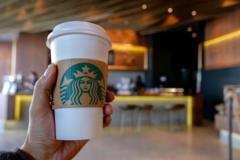As South Korea prepares for a pivotal presidential election, Starbucks has taken a unique step to ensure political neutrality by prohibiting customers from using the names of candidates when ordering. This move reflects the increasing political polarization in the country, spurred by the recent impeachment of former president Yoon Suk Yeol.
Starbucks Brews Neutrality Amid Political Climate in South Korea

Starbucks Brews Neutrality Amid Political Climate in South Korea
In a bid to maintain political neutrality, Starbucks temporarily bans ordering drinks with names of presidential candidates in South Korea.
Starbucks has temporarily disabled ordering drinks with the names of six candidates running for president in South Korea, amid escalating political tensions and a heightened sense of partisanship in the country. The coffee chain made this decision after witnessing customers use provocative nicknames in their app orders, leading to potential misunderstandings at the counter as baristas had to announce these controversial names. Starbucks emphasized that the ban is part of their effort to provide a positive and neutral experience during the tumultuous election season, which culminates on June 3rd.
This unique prohibition isn't an isolated incident; similar measures have been adopted by other platforms like Naver, a leading search engine in South Korea. They've disabled autocomplete suggestions related to political figures to foster a more accurate information environment during the campaign. The political atmosphere in South Korea has also left celebrities and public figures walking a tightrope as they strive for perceived neutrality, often scrutinizing their clothing and even gestures for possible partisan interpretations.
Dr. Cho Jin-man from Duksung Women's University highlights the importance of engaging in conversations without escalating political tensions. However, as societal divisions deepen, many citizens opt for silence to navigate the charged atmosphere. With such significant stakes tied to the upcoming election, every interaction – even those at a coffee shop – carries an air of heightened caution.
This unique prohibition isn't an isolated incident; similar measures have been adopted by other platforms like Naver, a leading search engine in South Korea. They've disabled autocomplete suggestions related to political figures to foster a more accurate information environment during the campaign. The political atmosphere in South Korea has also left celebrities and public figures walking a tightrope as they strive for perceived neutrality, often scrutinizing their clothing and even gestures for possible partisan interpretations.
Dr. Cho Jin-man from Duksung Women's University highlights the importance of engaging in conversations without escalating political tensions. However, as societal divisions deepen, many citizens opt for silence to navigate the charged atmosphere. With such significant stakes tied to the upcoming election, every interaction – even those at a coffee shop – carries an air of heightened caution.


















